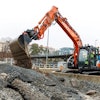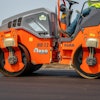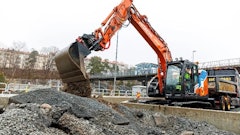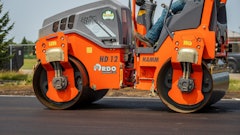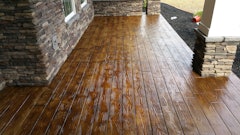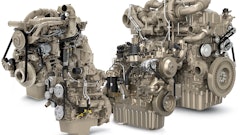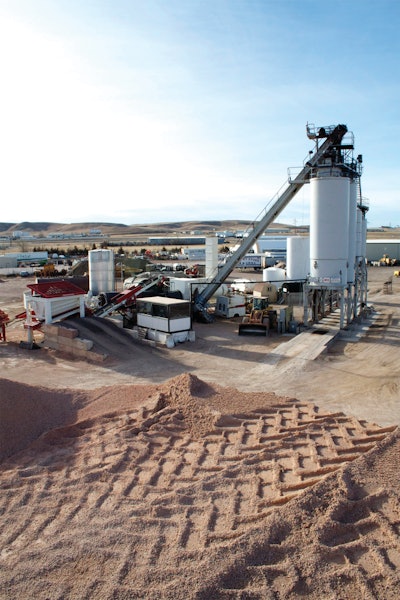
Many people dream of running a successful family business, and for J & J Asphalt in Rapid City, South Dakota, it’s been a dream come true. After being in business for more than 35 years, the company proudly remains family owned. Throughout the years, many things have stayed the same at J & J, such as the company’s values and its loyal employees. Another thing that hasn’t changed is its preference of asphalt plants. In fact, one could say it’s become a family tradition.
J & J entered the asphalt business with humble beginnings. Founded in 1977 by owner and president Jerry Wagner, the company started small, taking on a variety of patching and driveway paving jobs. Because of Wagner’s hard work and dedication, J & J grew. In less than 10 years he decided it was time to invest in an asphalt plant, which would allow him to control production.
“In 1985 we bought our first plant from Asphalt Drum Mixers,” said Wagner. “It was a used plant that I bought in new condition. It could produce up to 35 tons per hour.”
As the company continued to grow, it expanded its offerings. In addition to driveways and patching jobs, Wagner began taking on new types of paving jobs, including city streets, new housing developments and parking lots, as well as an occasional state highway. He also took on a larger territory, which today covers a 50-mile radius from Rapid City, including the entire Black Hills area.
Due to the increased workflow, J & J eventually outgrew its asphalt plant. So, in 1993 Wagner returned to ADM with an order for an 80-tph plant, which more than doubled the capacity of its previous 35-tph setup.
For more than 15 years, the 80-tph plant served Wagner’s needs well, but around 2010 he began considering the purchase of yet another plant. However, this time the main motivation for upgrading was not increased capacity, since the economic conditions at the time caused a slowdown in new housing developments. Instead, the recycled asphalt pavement (RAP) trend was the biggest reason for the switch. “We needed to start using recycled material in our mixes, but our 80-ton-per-hour plant wasn’t compatible with it,” said Wagner.
Because of his positive experiences with the first two asphalt plants, Wagner returned to ADM for the third. “From day one they’ve been excellent to work with,” he said. “I like that we can go directly to the source for sales and service, rather than going through a middle man. We have the office and cell phone numbers for ADM’s sales and parts department people, although we very seldom have to call them. And they always get back to us quickly, even on weekends and holidays. I just wish there were more companies like them.”
After working with ADM, Wagner purchased a RoadBuilder Series plant. RoadBuilder plants are available in portable and stationary versions with capacities ranging from 110 to 350 tph. Wagner’s specific model is stationary and produces 180 tph under his conditions. It features a parallel-flow drum that uses a unique flight design to move moisture-laden aggregate in a rotating veiled pattern away from the burner for efficient dying.
Since purchasing the RoadBuilder, Wagner has also added several used silos and recycle bins to meet state and local government mix designs. “The city allows us to use up to 15 percent RAP,” he said. “We can go up to 25 percent for residential and commercial paving jobs.”
Today, J & J produces between 70,000 and 100,000 tons of asphalt per year with its plant, making it the second largest asphalt producer in the Rapid City and Black Hills area. In addition to supplying its own needs, J & J generates extra revenue by selling asphalt to other companies in the area
Wagner takes pride in the company’s culture, which he feels is the heart of his business. J & J currently employs 39 people — many of whom have been with the company from 12 to 30 years. Among the employees are Wagner’s two sons. “They’ve been working with me since they were 16 years old,” he said. “My sons and I are very hands-on. We work alongside our employees on every project, and we treat our crew like they’re part of the family.”
In addition to its asphalt production crew, J & J has one paving crew, which uses eight Hamm rollers and two Vögele pavers. Within the last few years, Wagner has considered adding a second paving crew but has held off due to economic uncertainty.
Despite slower economic times, J & J has maintained a steady workload. “We haven’t done as many new housing developments lately, but we’re doing more restaurant and hotel parking lots,” said Wagner. “The tourism industry in the Black Hills is growing, so we’re getting new commercial jobs to replace our residential ones. We probably pave about 80 percent of the new parking lots in Rapid City.”
Furthermore, the city government has increased spending, which has also helped the cause for J & J. “Rapid City went from a $700,000 yearly paving budget to a $2 million budget,” said Wagner. “That’s helped take up some of the slack.”
In addition to its core projects, J & J has picked up several well-known customers throughout the years, such as Mount Rushmore, which has contracted with J & J multiple times to perform repairs and do an overlay. The company also does maintenance for nearby Ellsworth Air Force Base. “We have a five-year maintenance contract with the air force base,” said Wagner. “We do shoulder work, runway paving and taxiways, as well as streets on the air base.”
Wagner attributes much of his success to the family values of the company, and he’s proud to carry on the family-owned tradition with his two sons. He also gives some credit to ADM’s tradition of service. “I’m pleased to have partnered with ADM for more than 25 years,” he said. “I’m very happy with their products and their personnel…It’s been a great relationship.”


